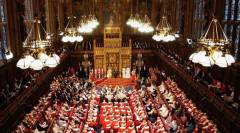LONDON, December 13, 2012
 |
The chamber has voted to reform the notorious Section 5 of the Public Order Act, under which several Christians have been arrested and detained for criticizing homosexual behavior. The government is under pressure to remove wording in the law that critics have said is seriously undermining the rights to freedom of speech.
The law says “a person is guilty of an offense if he - (a) uses threatening, abusive or insulting words or behavior, or disorderly behavior, or (b) displays any writing, sign or other visible representation which is threatening, abusive or insulting, within the hearing or sight of a person likely to be caused harassment, alarm or distress thereby.”
Campaigners, with support from all parties, have sought to remove the term “insulting” from the law, saying it is “subjective, open to misinterpretation and abuse, and undermines free speech.”
The law has been cited in arrests of atheists who have insulted religious people, Christians insulting homosexuals, and—in one notorious case—when student Sam Brown was arrested for calling a policeman’s horse “gay.”
This week, the House of Lords agreed when they voted 150 to 54 in favor of an amendment to the Crime and Courts bill, brought forward by Geoffrey, Baron Dear, a life peer and retired police officer who has long experience in criminal justice affairs. The move was supported by Director of Public Prosecutions, Kier Starmer, who said he was satisfied that the word could “safely be removed without the risk of undermining the ability of the CPS to bring prosecutions”
Perhaps uniquely in recent British political history, the Reform Section 5 (RS5) campaign is a joint effort of the National Secular Society and the Christian Institute, two groups normally at opposite ends of the political spectrum. The group, joined by homosexual activist Peter Tatchell, said that the law must be reformed, or one of the most precious and basic principles upholding democracy would continue to be threatened.
Campaign materials have included t-shirts and banners reading, "Feel free to insuit me."
One demonstration outside the Home Office involved Tatchell dressed as a policeman carrying a placard saying, “That’s insulting, you’re nicked!”
Although one of the country’s most notorious homosexual campaigners, Tatchell has frequently said that Christians should never be arrested for their opposition to homosexual activity.
Among the most articulate opponents of the law was the popular comedian Rowan Atkinson, best known as Mr. Bean. The funnyman has condemned “the Outrage Industry: self-appointed arbiters of the public good, encouraging media-stoked outrage.” In a speech at an RS5 meeting at Westminster in October, he warned against a “new intolerance” fueled by the “insult” wording, “a new and intense desire to gag uncomfortable voices of dissent.”
RS5 director Simon Calvert said he was “delighted” at the result of the Lords’ vote.
“Freedom of speech is such a vital part of British heritage, but this law has seen many people suffer – simply for speaking their mind,” he said.
The bill must now be approved by the House of Commons.
